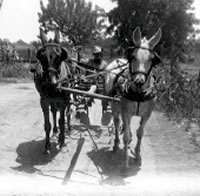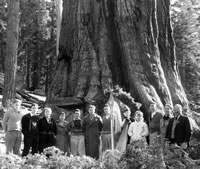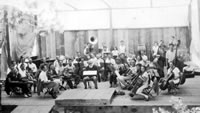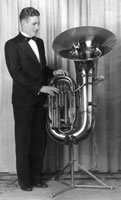
Reed’s dad with a team of mules about 1937

Sierra Music Camp participants at
Nation’s Christmas Tree

Alfred Hertz at Sierra Music Camp in 1934

Reed with Martin recording bass tuba

Sherman Dix Band in 1938 in Fresno, California
Home | Site Map | Photos | Contacts | Continue =>
[Editor's note: Reed passed away in December, 2003.]
My parents were dairy farmers, so during the Great Depression, I grew up on farms near Fresno, California. From the time I was 10 years old (1927) until I left home for college (1934), it was my job to milk 10 cows each morning and night as well as to do other work needed on the farm. One of the cows was appropriately named "Old Dynamite." If you milked this cow on her left side and forgot to hobble her, she would send you flying with a hard kick.
There was alfalfa in the fields that my older brother, Gayle, and I would mow, rake, and stack into shocks. We would then load the hay onto a horse-drawn wagon and stack it in the barn for storage.
The 4:15 a.m. train passing through Gregg, California every day was my father's alarm clock. He would wake my brother Gayle and me to help milk the 36 cows. After that, we would dress, eat breakfast, and walk a mile to the two-room, K-8 grade Sweetflower School in Gregg.
Miss Theresa Footman was a strict but wonderful principal and teacher.
Wonderful, loving parents made it a rich life, but during the Depression we accepted hard work and being poor as a normal way of life. Mother baked biscuits and prepared hot syrup every day for our breakfast. On the way to school, with a bag lunch prepared by mom, I would stop by one of our orange trees and pick an orange for lunch. The farm in Gregg had lots of fruit trees, so there was plenty to eat and to can. We had peaches, apricots, and oranges, blackberries, corn, string beans, and watermelons. We also raised chickens, turkeys, and hogs. I guess the farmers during the Depression had the advantage of not going hungry.
My mother played the piano and dad the harmonica, so my interest in music came naturally. When I entered Madera High School in 1930, I learned to play a school-owned clarinet. At the end of the year, we moved and I enrolled at Kerman High School. Kerman High had a state championship band, but no school-owned clarinet, and my parents couldn't afford to buy one. The band director, Major Earl Dillon, tried me out on several school instruments, and that's how I happened to become a tuba player.
During the summer, Major Dillon ran the Sierra Music Camp in the Sierra Nevada Mountains at Shaver Lake. I attended on a scholarship (plus doing odd jobs such as serving food and busing dishes).
Two of the guest instructors and directors were Alfred Hertz, legendary director of the San Francisco Symphony; and Frank Manchini, Modesto High School band director and former solo clarinet player with the John Philip Sousa Band.
Robert Ingraham, a Kerman High School graduate and a student at the University of Southern California (USC), also started learning to play the tuba that summer so he could play with the great USC Trojan Band. Later he became the tuba player with the Los Angeles Philharmonic Orchestra.
In 1933, my parents went to Fresno to arrange for food stamps. Those were tough times. It was a difficult decision for them to ask for help.
I graduated from Kerman High School in 1934 and worked that summer for a nearby cotton farmer, irrigating his crop. The pay was 10 cents an hour, so I made sure to keep the water running for at least 18 hours each day. When I enrolled at Fresno State College, I got a job on Saturdays at Woolworth's 5¢ & 10¢ store earning $2.65 a day plus all the chocolate candy I could eat while near the barrel.
Art Forsblad, The Fresno State College Band Director, also directed the 185th Infantry National Guard Band, which I joined in 1935. We earned $1.00 for each weekly rehearsal and also attended a two week active duty camp at San Luis Obispo, California.
In 1936 I joined the Fresno Municipal Band which played two concerts each Sunday in the Summer at Roeding Park and a downtown city park, so I resigned from the National Guard Band.
Tuba players were not in demand at that time, so I learned to play the string bass. My first job was at a "dime-a-dance" place for $1.00 an evening. Next, I got a job with the WPA, playing in their orchestra each morning and attended classes at Fresno State in the afternoons. My meals often consisted of a 10-cent can of vegetable-beef soup.
In 1936, my father lent me $50.00 for a down payment on a brand-new $350.00 Martin recording bass tuba.
I joined the Sherman Dix Band and the musicians' union, and from that point on, was financially better off-and was able to make the payments on the tuba. The Dix Band wrote their own arrangements, and they sounded like the well-known Jan Garber Band. Jan Garber had us travel to Hollywood to the Crosby Studios to make some records. When Jan took over and led us, we really sounded like the Jan Garber Band.
The Dix Band later became a Jan Garber Band and went on the road in 1940 playing mostly one-nighters in the Midwest. The U.S. entry into WWII broke up the band.